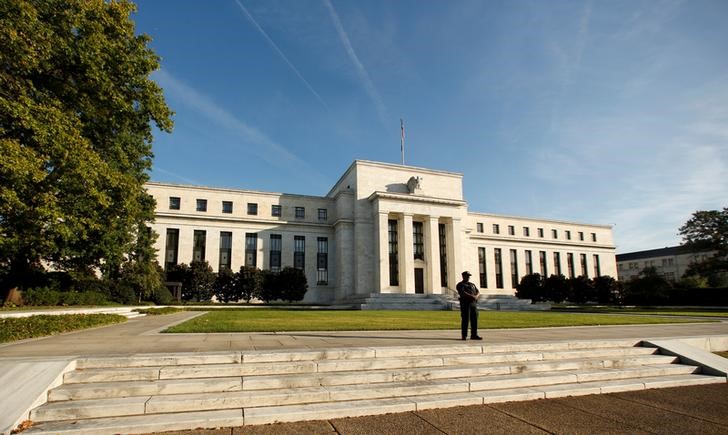By Vidya Ranganathan
SINGAPORE (Reuters) - The long cycle of falling interest rates in Asia could be over after the U.S. Federal Reserve's third rate rise in 15 months was followed quickly by monetary tightening in the world's second-biggest economy, China.
The Fed's widely anticipated rise of 25 basis points on Wednesday was also only its third since the global financial crisis, having reined in earlier temptations to raise rates out of concern for the impact on fragile emerging economies that still needed looser monetary conditions.
But the Fed signaled again that such reticence is over, repeating its projections for at least two more rate rises this year as the U.S. economy strengthens. (For a graphic on Fed's target rate and future projections click http://tmsnrt.rs/1PbXyzs)
"At the very least, the Fed's desire to step up the pace of policy normalization has changed the conversation at many central banks globally," said Sean Callow, an economist with Westpac in Sydney.
"Further monetary easing is now largely seen as only if needed to 'break the glass', not a plausible baseline."
The People's Bank of China promptly raised the rates on the short-term funding operations it conducts for the country's banks for a third time this year on Thursday.
The Fed's move would otherwise make it harder for China to stop its currency weakening and arrest a persistent outflow of capital. China also wants to cool a run-up in debt and the risk of a property bubble.
The Bank of Japan (BOJ) announced the verdict of its regular policy meeting on Thursday, opting to stand pat with its 0.1 percent short-term interest rate target and a loose commitment to keep buying bonds, though core inflation is far below its ambitious 2 percent target. (For a graphic on Asian central bank policy rates click http://tmsnrt.rs/2mv7VVh)
Some analysts expect the BOJ will in due course have to raise its zero percent yield target for 10-year Japanese government bonds.
Broader evidence of the shift in central bank thinking will be on hand later in the day as central banks in Indonesia, Norway, Switzerland and Britain review policy.
THE CURRENCY CHALLENGE
The Fed's new policy path is a sea change for global markets used to a decade of easy money. And while emerging markets are showing some signs of strength, with a recovery in commodity prices and growth in exports, they are struggling to fire up domestic demand.
But their freedom to fit domestic rates to local demand conditions is constrained by the need to keep hold of the foreign capital that flooded in seeking higher yields when developed world rates were at rock bottom. And they also need to prevent their currencies from tumbling against a rallying dollar.
"Even if domestic conditions warrant a cut, fears about exacerbating financial market volatility will keep central banks cautious," said Tim Condon, ING's chief Asia economist. "It definitely complicates life for those central banks that either needed to or wanted to cut rates."
Condon was expecting Indonesia's central bank to cut rates twice this year, but says he is now "uneasy" about that call.
"To the extent that U.S. rate hikes do put pressure on Asian central banks to tighten policy, it will be through currency movements," Gareth Leather, senior Asia economist at Capital Economics, said in a note.
Emerging markets have already had a dress rehearsal for such circumstances in 2013, when the threat of Fed policy tightening triggered a "taper tantrum" of volatility, prompting central banks in India, Indonesia and elsewhere to defend their currencies via higher rates.
South Korea is also juggling competing pressures. Its policy rates are barely above the Fed's, it wants to avoid unsettling a highly indebted housing sector, but it also has a huge amount of foreign money in its bond market that could take off for greener pastures.
The Fed's raise was not the only piece of news that could encourage the world's central banks to a firmer stance.
Elections in the Netherlands, where the anti-EU party of Geert Wilders won fewer seats than expected, came as a relief to markets, though next month's presidential election in France is still hanging over the continent, with the far-right Front National candidate Marine Le Pen showing strongly.
For Switzerland, uncertainty has the opposite effect on its safe-haven currency, driving it higher despite negative interest rates.
The Swiss National Bank is not expected to change its rates later in the day. Its negative rate policy, in place since 2015, is aimed at curbing demand for the currency in a period of destabilizing elections across Europe that could boost anti-establishment parties.
The Norwegian central bank, while keen to start raising rates, is likely to keep rates on hold, too, after a tumble in inflation as it worries about a strong currency.
The dilemma for the world's central banks is that markets driven by the Fed's lead will force them to respond, regardless of domestic conditions.
Callow at Westpac said the domestic logic, "in any country or zone where wages growth is weak and core inflation not on a clear self-sustaining uptrend", would otherwise be to ease policy.
"Which is actually most of the world," he said.
(Rreporting by Vidya Ranganathan; Editing by Will Waterman)
